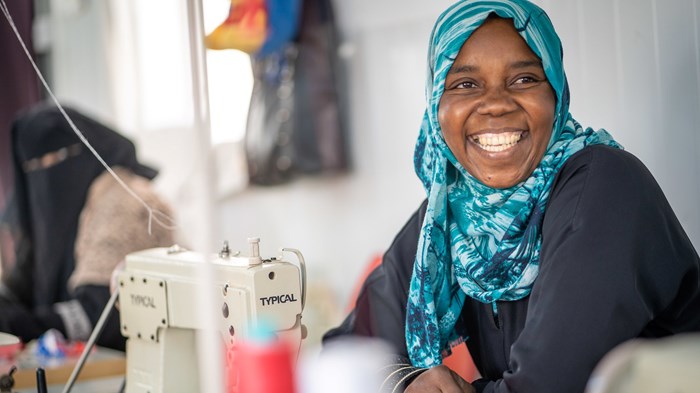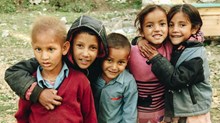On International Women’s Day, Welcome, Celebrate, and Co-create with Refugee Women

When Jenny came to the United States at the age of 19, she had already experienced significant trauma. By 13, she was forced to flee her home country of the Democratic Republic of the Congo because of violence. For the next seven years, she and her family lived in difficult conditions in a refugee camp in Namibia. Then the day came where they got word they could settle in the U.S.
Not soon after arriving, Jenny was told she was too old to go to high school. Recounting later of that time, she recalls having a meltdown due to “culture shock” and believing that her “hopes and dreams were shattered.”
I wish I could say Jenny is the exception rather than the rule. But the truth is that the barriers she experienced as a refugee are all too common. The resettlement process can be hard. For refugee women who have often faced sexual violence, abuse, discrimination, and limited access to education and health care, here in the U.S. they may also face barriers within systems and attitudes. Many encounter biases that assume their vulnerability and fail to recognize their potential, which continues to limit their opportunities. Additionally, many women feel tension between their culture’s gender roles and the culture of the U.S.
Too frequently, those of us who are not refugees underestimate the scope of challenges that refugee women face. There is still much work to be done. Helping refugee women succeed requires listening to their experiences and seeing obstacles clearly. It involves acknowledging that just because they are in the U.S., their lives are not free from trouble. We should acknowledge that they have the strength for the new challenges they may face. A coworker who is herself an immigrant from Myanmar recently wrote to me about this very issue, saying, “Refugee women who come to the U.S. are strong because they have to overcome countless struggles simply to make a life here. The difficulties do not end when they get here. In fact, there are many ways in which the U.S. is even harder because of the social and cultural dynamics!”
With International Women’s Day today, let me offer three ways that each of us can help #BreakTheBias with women who find themselves in a new country and community because of uncertain and unacceptable circumstances.
First, be a welcomer.
We are all familiar with the importance of hospitality. Romans 15:7 encourages us to “welcome one another as Christ has welcomed us.” And just as Christ welcomed us into His family, we were also once welcomed in by others. “Welcome” is a way of saying you belong and have a place here. It may seem like a small thing, but developing a posture of welcome and hospitality creates space for refugee and immigrant friends to feel safe.
We break the bias against women refugees and immigrants by hearing their stories. Learn about their experiences and stand alongside them. Hospitality is shown in specific ways — by sharing a meal, saying hello in a grocery store, offering a warm smile, or volunteering to practice English. Receiving and offering hospitality are gifts we are called to use.
Second, be a celebrator.
In addition to taking the posture of a welcomer, we commit to friendship and celebration. “Friendship is born at that moment when one person says to another, ‘You too? I thought I was the only one,’” wrote C.S. Lewis in The Four Loves. Each of the women who arrive in America, being made uniquely in the image of God, has gifts to offer to their new communities. Jenny’s desire is to “help others who can’t help themselves.” Her expression of how this happens may be different than another woman’s — some are savvy entrepreneurs, others have skills in cooking or artistry, and others are gifted leaders and hostesses.
Together we can celebrate that each person has a new gift to offer, and our job as welcomers and celebrators is to help erase the challenges that prevent so many skillful, resourceful women from achieving their goals. This can take many forms, and I think is most powerful in the form of partnership, friendship, and mutual learning. As I have gotten to know many of these women through World Relief, I’ve listened to their challenges. They invite you and I to come alongside them in their new endeavors and to celebrate their accomplishments every step of their journey.
Third, be a co-creator.
If we are to be a community and people that break the bias and that welcomes and celebrates refugee women, we must do it together. We must be co-creators alongside refugee women who have shown incredible strength, courage, and resilience. We don’t simply offer them a seat at the proverbial table. Instead, we create space for us all to design the table together. Even when the heavens and the earth were made, God did it in community. Together, the Father, Son, and Holy Spirit fashioned a world of beauty and goodness.
An example of how this might look is working together to advocate and create policies that help women have equal access to English classes and continued orientation about the U.S. It means advocating for good childcare options so they do not miss out on opportunities.
Co-creating alongside others involves a posture of humility and learning. We recognize that many women have led complex lives that can inform a new way of dwelling and growing together. On the outside, co-creating offers an open hand and a warmth of hospitality for those who are newly arrived. On the inside, co-creating stems from an understanding that the place we reside in belongs to all of us equally and that we are all made in God’s image.
Let’s move forward, together.
We cannot erase the fact that refugee women experience high rates of sexual violence, have stories of trauma, and will continue facing discrimination and harassment in their lives here in the United States due to their gender, religion, ethnicity, and refugee status.
What we can do is to welcome, celebrate, and co-create with them a future that will honor both their present and their past. There are countless ways to do this; we just need to take the first step.
Oh, and Jenny? She found a way to not only get her high school diploma but to earn a college degree as well. She is now working in digital marketing and hopes to pursue a law degree and work at the United Nations, making the lives of the vulnerable better.
Jenny is only one of thousands of refugee women who, when given a chance, will make our communities — and our world — even better.
Susan Sperry is executive director of World Relief Chicagoland, which is committed to #breakingthebias this International Women’s Day.
The Better Samaritan is a part of CT's
Blog Forum. Support the work of CT.
Subscribe and get one year free.
The views of the blogger do not necessarily reflect those of Christianity Today.





















